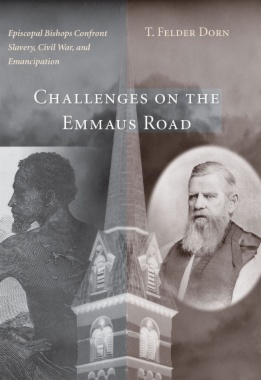While slavery and secession divided the Union during the American Civil War, they also severed the Northern and Southern dioceses of the Protestant Episcopal Church. In Challenges on the Emmaus Road, T. Felder Dorn focuses on the way Northern and Southern Episcopal bishops confronted and responded to the issues and events of their turbulent times.
Prior to the Civil War, Southern bishops were industrious in evangelizing among enslaved African Americans, but at the same time they supported the legal and social aspects of the "peculiar institution." Southern and Northern bishops parted company over the institution of slavery, not over the place of blacks in the Episcopal Church. As Southern states left the Union, Southern dioceses separated from the Episcopal Church in the United States.
The book's title was inspired by the Gospel of Luke 24:13-35 in which the resurrected Jesus Christ walked unrecognized with his disciples and discussed the events of his own crucifixion and disappearance from his tomb. Dorn perceives that scriptural episode as a metaphor for the responses of Episcopal bishops to the events of the Civil War era.
Dorn carefully summarizes the debates within the church and in secular society surrounding the important topics of the era. In doing so, he lays the groundwork for his own interpretations of church history and also provides authentic data for other church scholars to investigate such topics as faith and doctrine, evangelism, and the administrative history of one of the most important institutions in America. Dorn devotes the final chapters to the postwar reunification of the Episcopal Church and Southern bishops' involvement in establishing the Commission on Freedmen to offer help with the educational and spiritual needs of the recently emancipated slaves.
- Cover�������������������������������
- CHALLENGES ON THE EMMAUS ROAD�������������������������������������������������������������������������������������������������������
- Title�������������������������������
- Copyright�������������������������������������������
- Dedication����������������������������������������������
- CONTENTS����������������������������������������
- List of Illustrations�������������������������������������������������������������������������������
- Preface�������������������������������������
- Acknowledgments�������������������������������������������������������������
- PART 1 Historical Background
- The Protestant Episcopal Church in the United States: A Sketch of the Years before 1860�������������������������������������������������������������������������������������������������������������������������������������������������������������������������������������������������������������������������������������������������������������������������������������
- Slavery in the United States: A Brief History�������������������������������������������������������������������������������������������������������������������������������������������������������
- PART 2 Episcopal Bishops in the Antebellum Era
- Preamble����������������������������������������
- Stephen Elliott of Georgia and Thomas Frederick Davis of South Carolina�������������������������������������������������������������������������������������������������������������������������������������������������������������������������������������������������������������������������������������
- William Meade and John Johns of Virginia����������������������������������������������������������������������������������������������������������������������������������������
- Thomas Atkinson of North Carolina and William Rollinson Whittingham of Maryland�������������������������������������������������������������������������������������������������������������������������������������������������������������������������������������������������������������������������������������������������������������
- A Tale of Two Bishops: An Intersectional Friendship�������������������������������������������������������������������������������������������������������������������������������������������������������������������������
- Bishops in the Slaves States: Their Beliefs about and Responses to Slavery in the Antebellum Period�������������������������������������������������������������������������������������������������������������������������������������������������������������������������������������������������������������������������������������������������������������������������������������������������������������������������
- Richmond, Virginia, 1859: Ceremony, Church Business, and an Issue Ignored�������������������������������������������������������������������������������������������������������������������������������������������������������������������������������������������������������������������������������������������
- PART 3 Secession and Church Division
- Preamble����������������������������������������
- Prelude to Montgomery: Southern Bishops Confront Secession, Threat of War, and Talk of Church Division����������������������������������������������������������������������������������������������������������������������������������������������������������������������������������������������������������������������������������������������������������������������������������������������������������������������������������
- A Separate Church for a Separate Nation: The Southern Bishops Choose Church Division����������������������������������������������������������������������������������������������������������������������������������������������������������������������������������������������������������������������������������������������������������������������������
- A Tale of Two Bishops Redux: A Friendship Ruptures����������������������������������������������������������������������������������������������������������������������������������������������������������������������
- A Controversial Consecration and a Bishop’s Death: Richard Hooker Wilmer and William Meade����������������������������������������������������������������������������������������������������������������������������������������������������������������������������������������������������������������������������������������������������������������������������������������������
- Assembly under Most Afflicting Circumstances: The Northern Bishops in General Convention in 1862����������������������������������������������������������������������������������������������������������������������������������������������������������������������������������������������������������������������������������������������������������������������������������������������������������������
- Church Division Is Ratified: The First General Council of the Protestant Episcopal Church in the Confederate States of America����������������������������������������������������������������������������������������������������������������������������������������������������������������������������������������������������������������������������������������������������������������������������������������������������������������������������������������������������������������������������������������������������������
- PART 4 Slave State Bishops and Civil War
- A Tragic Ending: The Wartime Episcopate of James Hervey Otey of Tennessee�������������������������������������������������������������������������������������������������������������������������������������������������������������������������������������������������������������������������������������������
- The Wartime Episcopate of Bishop Elliott of Georgia: A Chronicle of Christian Patriotism����������������������������������������������������������������������������������������������������������������������������������������������������������������������������������������������������������������������������������������������������������������������������������������
- John Johns of Virginia: A Wartime Episcopate in a Battleground State����������������������������������������������������������������������������������������������������������������������������������������������������������������������������������������������������������������������������
- The Impact of War on an Episcopate: Thomas Frederick Davis of South Carolina����������������������������������������������������������������������������������������������������������������������������������������������������������������������������������������������������������������������������������������������������
- Thomas Atkinson of North Carolina: Wartime Episcopate�������������������������������������������������������������������������������������������������������������������������������������������������������������������������������
- Richard Hooker Wilmer of Alabama: An Episcopate Begun in Wartime����������������������������������������������������������������������������������������������������������������������������������������������������������������������������������������������������������������
- Bishops in the Confederate States in Wartime: Some General Observations�������������������������������������������������������������������������������������������������������������������������������������������������������������������������������������������������������������������������������������
- Episcopates in States Divided: Bishops in Slave States in the Union�������������������������������������������������������������������������������������������������������������������������������������������������������������������������������������������������������������������������
- Polk, Lay, and Quintard: The War Up Close and Personal����������������������������������������������������������������������������������������������������������������������������������������������������������������������������������
- PART 5 Northern Bishops and Civil War
- A Tale of Two Northern Bishops: John Henry Hopkins and Alonzo Potter����������������������������������������������������������������������������������������������������������������������������������������������������������������������������������������������������������������������������
- Henry Benjamin Whipple of Minnesota: A Bishop Confronts War on Two Fronts as well as the Institution of Slavery and the Rights of Indians�������������������������������������������������������������������������������������������������������������������������������������������������������������������������������������������������������������������������������������������������������������������������������������������������������������������������������������������������������������������������������������������������������������������������������������������
- Charles Pettit McIlvaine: The War Years between National Conventions����������������������������������������������������������������������������������������������������������������������������������������������������������������������������������������������������������������������������
- Overview of Issues Faced by Northern Bishops during the Civil War�������������������������������������������������������������������������������������������������������������������������������������������������������������������������������������������������������������������
- PART 6 Aftermath—The Perspective of the National Church
- Confrontation in Alabama: The Bishop and the General����������������������������������������������������������������������������������������������������������������������������������������������������������������������������
- What Price Reunion? The Philadelphia Convention, 4–24 October 1865����������������������������������������������������������������������������������������������������������������������������������������������������������������������������������������������������������������������
- Closure with Dignity����������������������������������������������������������������������������
- Confrontation in Alabama: The Bishop and the General, Redux�������������������������������������������������������������������������������������������������������������������������������������������������������������������������������������������������
- The Freedman’s Commission�������������������������������������������������������������������������������������������
- PART 7 Aftermath from the Diocesan Perspective and Concluding Observations
- Preamble: Two Vignettes�������������������������������������������������������������������������������������
- Aftermath in Georgia: Stephen Elliott�������������������������������������������������������������������������������������������������������������������������������
- Aftermath in South Carolina: Thomas Frederick Davis�������������������������������������������������������������������������������������������������������������������������������������������������������������������������
- Aftermath in North Carolina: Thomas Atkinson����������������������������������������������������������������������������������������������������������������������������������������������������
- Aftermath in Virginia: John Johns�������������������������������������������������������������������������������������������������������������������
- Aftermath in Former Slave States in the Union: Benjamin Bosworth Smith, William Rollinson Whittingham, Alfred Lee, and Cicero Stephens Hawks����������������������������������������������������������������������������������������������������������������������������������������������������������������������������������������������������������������������������������������������������������������������������������������������������������������������������������������������������������������������������������������������������������������������������������������������������
- Concluding Observations�������������������������������������������������������������������������������������
- Bibliography����������������������������������������������������
- Index�������������������������������

